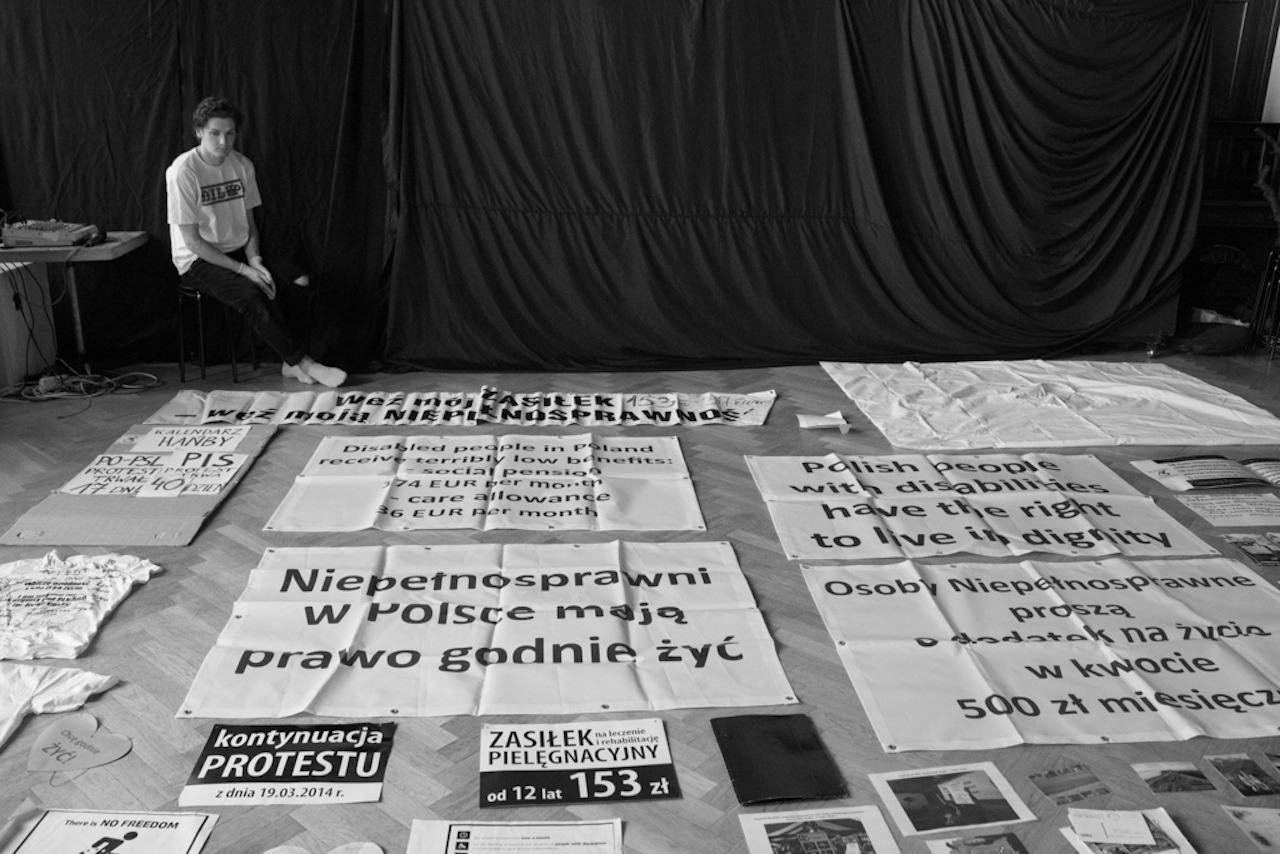Disability and Society. The Performative Power of Protest
The programme summary and book publication

Disability and Society. The Performative Power of Protest – the newest offering born from the cooperation between Biennale Warszawa and Theatre 21 will be published on 21 January 2019. On this occasion we would like to invite you to meet its authors: Justyna Lipko-Konieczna and Ewelina Godlewska-Byliniak. Piotr Morawski from the University of Warsaw will be the event host.
The book Disability and Society. The Performative Power of Protest is the result of the project of the Centre of Inclusive Art: Downtown carried out in cooperation by Biennale Warszawa and Theatre 21 from September to December 2018.
The publication will be made available for free as an e-book, while the printed edition will be distributed to libraries, research centres and organisations involved in disability issues.
“The audacity with which authors-editors combine various levels of reflection on disability not only has persuasive qualities, but above all, it opens one’s eyes to the integral presence of people with disabilities in the visibility space, when it comes to the issues of emancipation and self-organisation, performance and activism.
(dr hab. Joanna Krakowska, Institute of Art of the Polish Academy of Sciences)
Disability and Society is a book born from the consideration of the protest of people with disabilities, combining the theoretical perspective, social activism, reflection on the history of the movements of people with disabilities, and artistic practice.
Its point of departure is, on the one hand, over 40-day-long protest of people with disabilities and their carers which took place in the seat of the Polish parliament in April and May 2018, and on the other hand, the question about various forms of resistance and struggle launched, subjected to critical reflection, and initiated in the field of theatrical and performative actions. Hence the reference to the piece currently performed by the Theatre 21 – Revolution that never was – which was in preparation concurrently with the work on this publication. The direct trace of the theatre piece in the book can be found in the texts by Barbara Lityńska, one of the Theatre 21 performers. Due to their strong author’s voice, they serve as both an introduction to and a commentary on the considerations of the protests held by people with disabilities, including historical contexts of such initiatives. The Revolution that never was, evoked here as a point of reference, is also treated as a consequence of previous activities of Theatre 21 and its involvement. Hence the reference to one of the previous performative actions – Pesach is a festival of freedom from April 2016 – which gains new strength when looked at from the perspective of the later protest in the Sejm; it inspires reflection on the language, autonomy, and subjectivity in the context of disability.
“The book is a reaction to the protest of Parents of Persons with Disabilities in the Sejm. An immediate, substantive and theoretical reaction that combines all advantages of the engaged humanities, not only commenting social developments, but providing analytical tools, evoking historical references and building a broad contextual framework for the spring protest in the Sejm.”
(dr hab. Piotr Morawski, University of Warsaw)
The historical context here is provided primarily by source texts from 1970s, introducing us to the principles of the British Union of the Physically Impaired Against Segregation, an organisation whose political and intellectual activism laid foundations for the so-called social model of disability. It became crucial for the development of the activism of people with disabilities, eventually recognised as a political force, and well as for disability studies in the UK. The movement of people with disabilities in the context of other emancipatory and civil rights movements is tackled in the text by Tom Shakespeare, one of the most important researchers in British disability studies.
Another important historical context featured in the book is the history of protests of people with disabilities in the US, evoked through the photography of Tom Olin, documenting American activists of the 80s.
The heart of the book comprises texts referring directly to the Sejm protest, launching various voices and types of discourse: the conversation of activists and people involved in the protest, a journalistic piece commenting the protest and recognising its importance even as it was still ongoing, and finally a text asking, in the light of the protest, a fundamental question in the spirit of Hannah Arendt – about the right to have rights.
| Data | Czas | Tytuł | Miejsce | Wstęp |
|---|---|---|---|---|
|
January 21 2019
, 18:00
Monday
|
18:00 |
Disability and Society. The Performative Power of Protest |
Biennale Warszawa 34/50 Marszałkowska Street (MA3450) |
Free entry |

